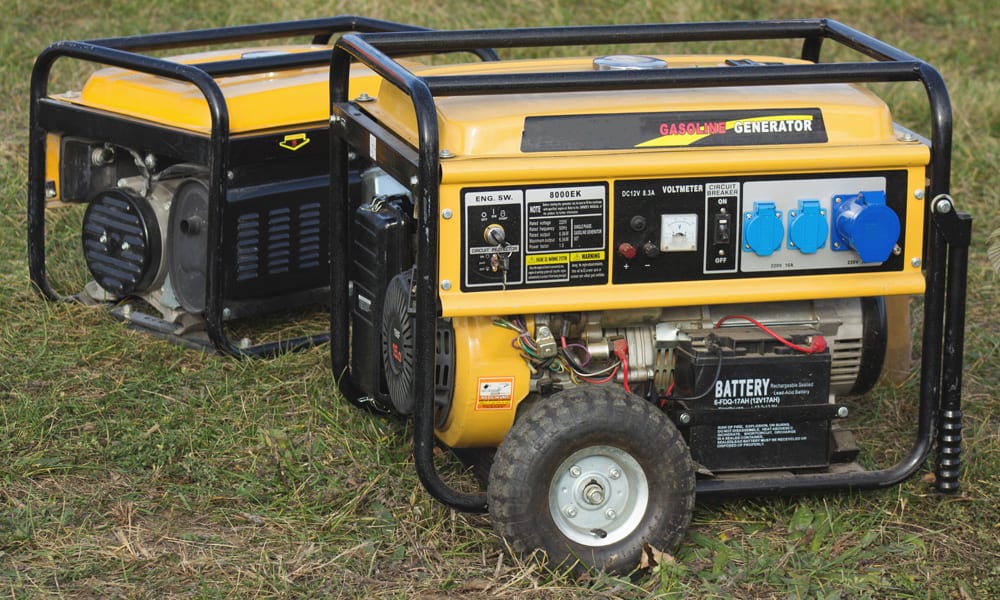10 Best Generators in 2022
Keep your life running interruption-free with a quality generator
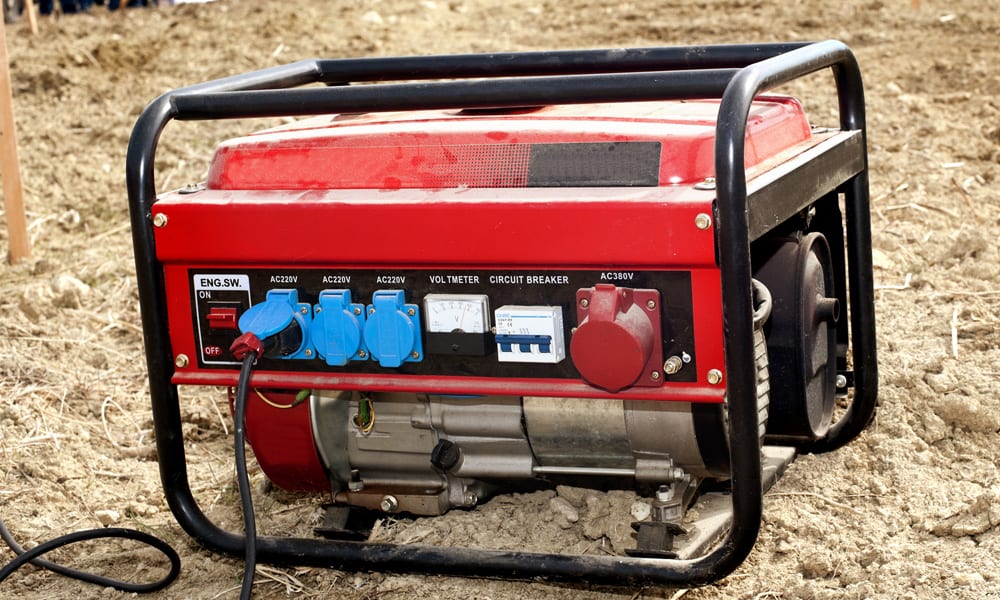
Generators are a handy piece of equipment to invest in. They provide backup power to keep your home a safe and secure place to ride out a storm or electrical outage, powering your fridge, furnace, and security system. Portable generators can provide power to your RV or electrical connections for a job site when you’re not close to an electrical hookup. Having a stand-alone power source is a luxury many homes, campers, and businesses could benefit from – but it doesn’t come cheap.
A generator is an appliance used to provide electricity in areas or times with no other electricity source. Using motors and cranks, they force electric charges into their internal components through external electric circuits. They don’t technically produce electricity but instead move electrical charges to output an electrical current. In theory, this is similar to how a water pump doesn’t create water but moves it from one place to another, creating a current.
Purchasing a generator is an investment. It can be vital for those in stormy areas, who often experience blackouts, or business owners needing to run equipment on an unimproved job site. Whenever you’re spending a good deal of money on a piece of equipment, you want to make sure you’re getting the best one that’s perfectly suited to meet your needs.
Buying the best generator for you can seem like a daunting task. We’ve used customer reviews, information from renowned brands, and current specification charts to compile a list of the ten best generators. It includes the best portable generators, the best standby generators, and the best inverter generators to cover various uses.
10 Best Generators on the Market for 2022.
- Champion Power Equipment 9375 Dual Fuel Generator
- Generac 70432 Home Standby Generator
- WEN 56200i Portable Inverter Generator
- Champion Power Equipment 200988 Dual Fuel Portable Inverter
- NATURE’S GENERATOR GXNGAU Solar Powered Portable Generator
- Westinghouse 7500 Gas Powered Portable Generator
- DuroMax XP12000EH Generator
- WEN DF1100T Dual Fuel Portable Generator
- Sportsman Dual Fuel Powered Portable Generator
- Honda EU2200i Portable Inverter Generator
1. Champion Power Equipment 9375 Dual Fuel Generator
The best overall dual-fuel portable generator

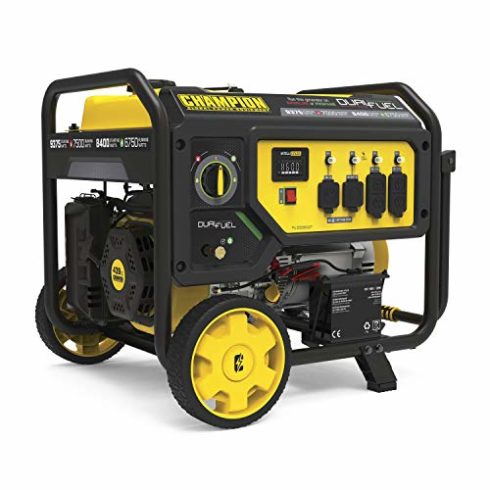
Champion’s 9375 open-frame generator is a great combination of convenience and versatility, making it a top choice for the best portable generator. The 439cc 4-stroke engine starts either by recoil or electric start. It's assisted by Cold Start Technology to start faster in winter conditions. Right out of the box, this model has a run time of 10 hours on gasoline at a 50% load and 5.5 hours using propane.
The VoltGuardTM surge protection keeps the six 120/240V AC outlets from overloading so you can power your home or job site with little worry. The twist-lock L14-30R receptacle is transfer switch ready, so you can easily connect it to your home’s breaker box for backup power.
With the ability to use either gasoline or propane, the Champion 9375 is a budget-friendly option. It's easy to use and delivers great power output. It's also easily portable and offers various outlet configurations. It’s one of the best portable generators suitable for home and professional use.
Check Price on Amazon ➞TRACTOR SUPPLY CO ➞
2. Generac 70432 Home Standby Generator
The best home-standby generator
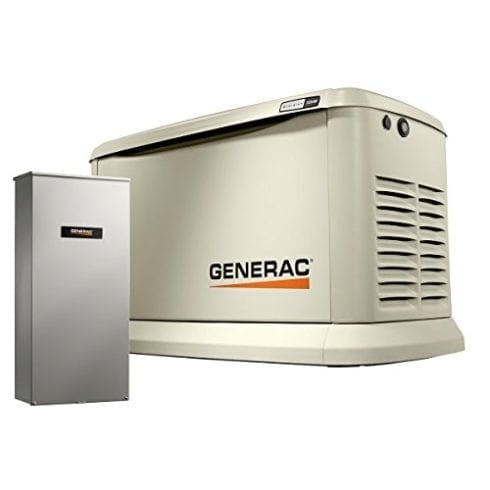
If you're in the market for a whole-home standby generator, look no further than the Generac 70432. Boasting a G-Force 1000 Series V-Twin overhead valve industrial engine and a 200-Amp, NEMA 3R, outdoor-rated automatic transfer switch, it's one of the best home standby generators on the market. In the event of a power outage, natural gas or propane is used to generate 19.5 to 22 kilowatts (LP and NG, respectively) of utility-grade electrical current.
Coated in RhinoCoat powder-coating, the aluminum enclosure houses all of the home standby generator components, protecting them from wind and rain. Trademarked Generac technology allows you to monitor the system from anywhere using your smartphone or tablet; a Quiet TestTM mode allows you to exercise the standby generator on a designated schedule, ensuring your system performs at its best.
The Generac 70432 generator takes all worries out of electrical outages and emergencies. Within seconds your entire home is powered with utility-grade power, offering the lowest-cost-per-kilowatt MSRP of any residential generator.
Check Price on Amazon ➞3. WEN 56200i Portable Inverter Generator
The quietest gasoline-powered inverter generator
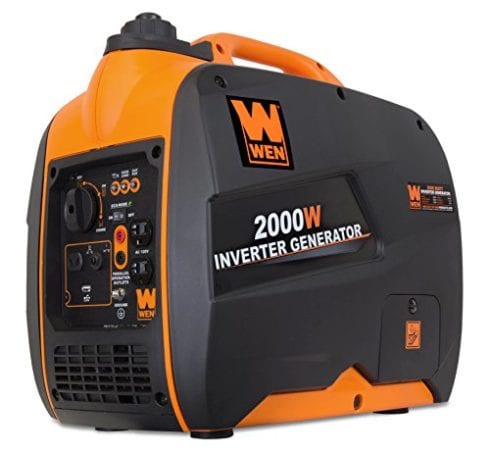
WEN’s 56200i portable generator is affordable, lightweight, and quiet. Using inverter technology, it efficiently produces 1600 rated watts of clean current to power even your most sensitive microprocessor-based devices when the power goes out. Its 79.7 cc 4-stroke OHV engine is EPA III and CARB compliant.
As one of the quietest portable generators on this list, it operates at a mere 53 decibels when running at quarter load. The intuitive user panel includes two three-prong 120V receptacles, one 12V DC receptacle, and one 5V USB port to power a range of items. The eco-mode adjusts gas consumption as cords are plugged and unplugged to improve fuel efficiency.
The WEN 56200i produces a clean current at a noise level lower than average conservation. It’s a great source of portable power for charging devices when camping or at home during power outages.
Check Price on Amazon ➞VIEW ON HOME DEPOT ➞
4. Champion Power Equipment 200988 Dual Fuel Portable Inverter
The best RV-ready generator
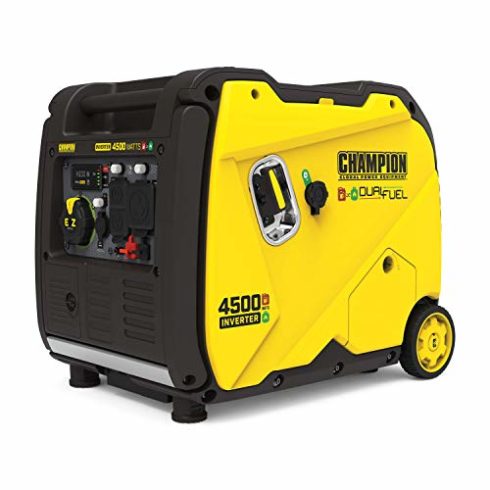
There’s no need to make all your neighbors mad at you when operating the Champion 4500W-Watt portable inverter. Whether camping or powering appliances at home, this 212cc generator will run on gasoline or propane, easily switching with a quick turn of the fuel selector knob. A standard 30-Amp RV outlet is right on the well-designed user panel.
At 25% load, it features 4500 starting watts and 3,150 running watts. 14 hours on gasoline or up to 21 hours when hooked to a 20-pound propane cylinder. Generating 61 dBa at about 23 feet won’t bother neighbors when used at home during a power outage or disrupt the peacefulness of your surroundings when camping.
Right out of the box, the Champion 4500-Watt Portable Inverter is ready to go on your next RV’ing adventure. Equipped with a 30-Amp RV outlet, it is capable of running two 15,000 BTU air conditions.
Check Price on Amazon ➞TRACTOR SUPPLY CO ➞
5. NATURE’S GENERATOR GXNGAU Solar Powered Portable Generator
The best environmentally-friendly portable generator
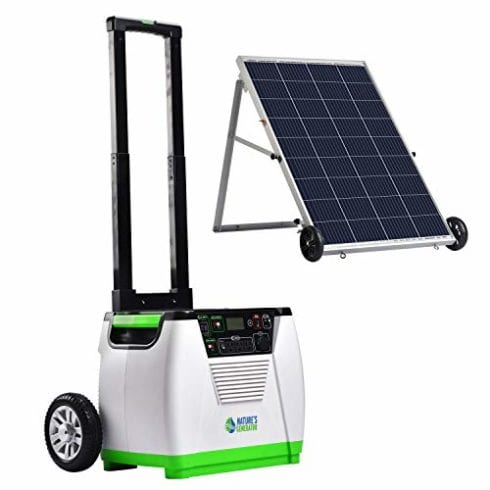
With Nature’s Generator portable generator, you can create free electrical current using either the sun or wind. An included 100-watt solar panel captures the sun’s energy, storing it in the battery until internal electrical components convert it to usable AC. For those in gusty climates, you can purchase a wind-turbine port.
A central LCD makes it easy to read all of the pertinent system information. The control panel features 3 120-V AC outlets to deliver up to 1800-watts of pure sine wave current, clean enough to provide backup power to even your most sensitive electronics. This Nature’s Generator also has a single 12-V DC outlet and two USB ports to charge various items.
With their solar-powered, portable generator, Nature’s Generator allows you to provide AC power to devices and small appliances without any noise or any need for gasoline, making it one of the more environmentally sustainable generators on the market.
Check Price on Amazon ➞VIEW ON HOME DEPOT ➞
6. Westinghouse 7500 Gas Powered Portable Generator
The easiest-starting portable generator
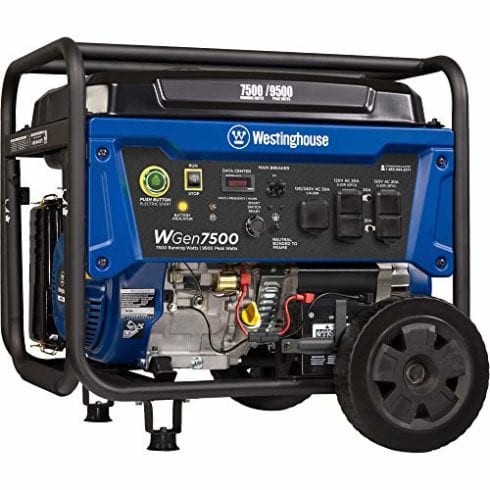
Powered by an impressive 420cc Westinghouse 4-stroke OHV engine, the WGen7500 generator produces 9500 peak watts and 7500 rated watts. It's perfect for an emergency back-up for your home or a portable source of power. The L14-30R 120/240-Volt twist-lock receptacle is transfer switch ready, negating the need to purchase additional accessories to power your home.
Equipped with a push-button electric start and a wireless remote key fob, the WGen7500 starts effortlessly and operates for up to 11-hours. A durable cast-iron sleeve protects the engine from the elements, while the rubber outlet covers keep water and debris out of the plugs.
The WGen7500 takes all of the frustrations out of starting your gas-powered generator by pairing a push-button electric start and wireless remote key fob. With a large fuel capacity, this transfer switch-ready workhorse will churn out many watts for long periods of time.
Check Price on Amazon ➞VIEW ON HOME DEPOT ➞
7. DuroMax XP12000EH Generator
The best home backup portable generator
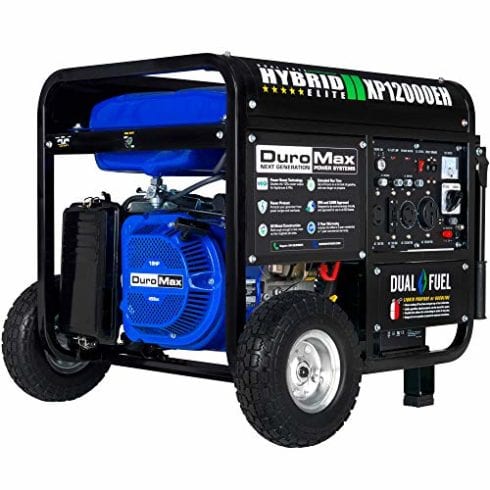
Featuring a 457cc 4-stroke OHV engine, the DuroMax XP12000EH cranks out a powerful 12,000 starting watts and 9500 rated watts when using gasoline. Without a doubt, this generator will power through any storm, handling your lighting circuits, appliances, and even your home’s A/C unit. You can expect to get almost 9 hours of use on gasoline and just over 7 hours with a 40-pound propane cylinder at half load.
As the most powerful portable generator on the list, the full-featured power panel offers two household 20-amp GFCI outlets, a heavy-duty 50-amp outlet, one 20V 30A twist-lock outlet, and one 120/240V 30A outlet on the control panel. Using patented MX2 power boost technology, you can operate the generator at 120V and 240V simultaneously or solely at 120V.
The DuroMax’s MX2 power boost technology lets your use both the 120V and 240V twist lock outlets simultaneously, or use both at 120V to draw full power. A large gas tank also means it runs for long periods of time.
Check Price on Amazon ➞TRACTOR SUPPLY CO ➞
8. WEN DF1100T Dual Fuel Portable Generator
The best bargain 11Kw portable generator
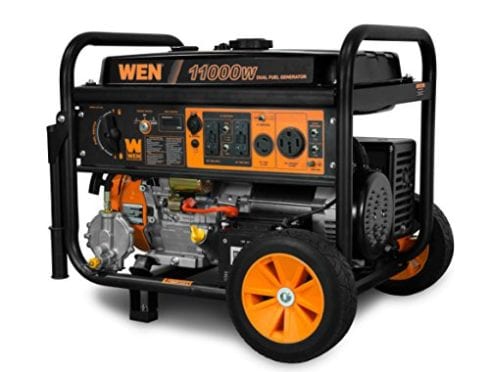
Create power using either gasoline or propane to drive the 457cc 4-stroke OHV engine on this WEN portable generator. As one of the best high-capacity generators on this list, it produces 11,000 surge watts and 8,300 running watts with gasoline or 9500 surge and 7500 running watts with propane.
The expansive panel features four 120V household GFCI outlets, a 120V 30A twist-lock outlet, a 120V/240V 50A outlet, and a 12Vt DC cigarette-lighter-style plug. This generator can handle your lights, TV, refrigerator, or power tools with ease. A moderate price tag keeps this highly-rated dual fuel generator from breaking the bank.
The WEN DF1100T is a fantastic combination of power and features at an affordable price. Easily power a range of home appliances or power towels at the job site with the transfer switch-ready generator.
Check Price on Amazon ➞VIEW ON HOME DEPOT ➞
9. Sportsman Dual Fuel Powered Portable Generator
The best economically-priced generator
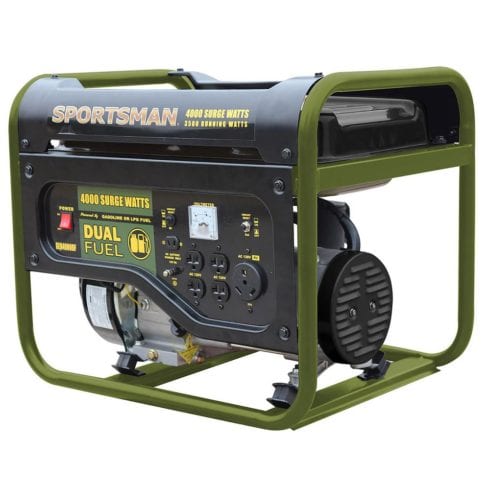
For great power at an economical price, you can’t go wrong with the Sportsman portable generator. The 212cc 4-stroke engine will run for up to 10 hours at a 50% load using fuel, and 12 hours using propane. Don’t let its simple appearance fool you. This generator offers all the safety features you need, including a spark arrestor, low oil shutoff, automatic voltage regulation, circuit breakers, and an engine shut-off switch.
The Sportsman portable generator produces 4000 peak watts and 3500 running watts on gasoline to power most of your household appliances or power tools.
If you’re in the market for a simple generator that can power basic tools or household items without spending a lot, the Sportsman model is a great choice. It offers plenty of power and reliability while being economical.
Check Price on Amazon ➞VIEW ON HOME DEPOT ➞
10. Honda EU2200i Portable Inverter Generator
The quietest, most compact portable generator
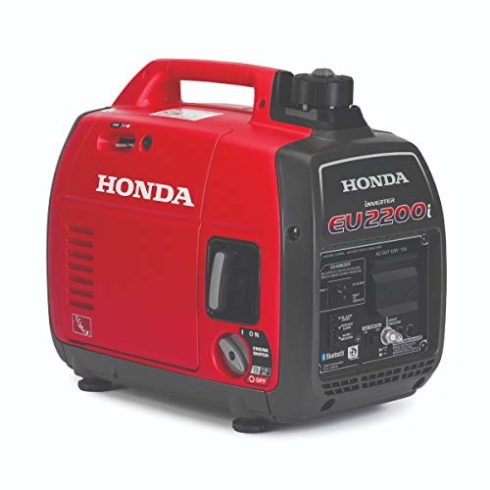
Honda’s innovative inverter technology provides 2200 start-up watts of clean, fuel-efficient power to its two 120V AC outlets via a commercial series 121cc engine. It operates at a mere 48 to 57 dBa, making it perfect for tailgating, camping, or supplementing your RV’s power.
CO-MINDERTM continuously monitors carbon monoxide levels around the unit, automatically shutting the generator down before reaching dangerously high values, keeping everyone safe from carbon monoxide poisoning. When running at a 25% load, it will operate for up to 8 hours on less than a gallon of gasoline, making it perfect for overnight power.
Quiet, lightweight, and compact, the Honda EU2200i provides clean AC power to charge your smartphone or tablet and run small appliances like TVs, coffee pots, and satellite systems.
Check Price on Amazon ➞VIEW ON HOME DEPOT ➞
Generator buyer’s guide
There are many factors to take into account when shopping for the best generator. Factors such as wattage, fuel type, and noise level can all affect your decision. These are just a few of the considerations you should keep in mind before making a purchase. This guide offers advice on how to find the right generator for you so that you can shop with confidence.
What to look for when buying the best generator
Generators are beneficial, powerful appliances that serve a multitude of purposes. They can be used as a backup power source to keep you safe, secure, and connected in your home during an emergency, natural disaster, or power cut. Portable generators can be used for RV vacations to keep your camper supplied with electricity when you’re staying in locations without hookups. You can also use them on job sites to power air compressors, nail guns, and saws.
While generators offer much versatility and provide an invaluable service, these small devices often come with a hefty price tag. This expense is justified, but this means it’s more essential that you look at all the different features on various generators to find the one best suited to your needs.
To help make the search for the best generator easier, we’ve compiled a list of features you should consider before purchasing.
Wattage
Wattage will determine how powerful the generator is and, in turn, how many appliances or other tools and devices it can power. The higher the wattage, the more expensive the generator.
- 3000 to 4000-watt portable generators will power your RV, including the fridge, furnace, TV, and lighting circuits.
- 5000 to 7500-watt generators will power lights and keep things like a fridge, freezer, or well pump operating, but not at the same time.
- 7500-watt generators will keep the lights on and power most household appliances simultaneously, minus the furnace or air conditioner.
- 10,000-watt generators generally run all critical household items, including the furnace or air conditioner, at the same time. They also power most heavy-duty tools used on a construction site.
- 12,500-watt generators will power your entire house without missing a beat.
When looking at a generator’s wattage, there are two numbers to keep in mind. One is the starting watts, and the other is the running watts or rated watts. Household appliances, furnaces, air conditioners, and construction tools need more watts starting up. Once they’re running, the power usage drops or settles out slightly. In turn, generators will have higher starting watts than running power. Make sure the starting power is high enough for your equipment.
Standby or portable
Home standby generators are meant to automatically provide power to your entire house within seconds of a power outage. They are permanently installed and typically tap into an existing fuel source such as natural gas or propane. While very convenient and powerful, standby generators are costly.
Portable generators don’t have as much power and don’t turn on automatically like standby generators. They may not power the entire home and cannot run for an extended period, but they are much less expensive and can be moved to different locations. When looking at portable generators to power your entire home, make sure they are transfer switch-ready.
Conventional or inverter
The main technical difference between the two different types of generators is the type and amount of power each produces.
Conventional generators only produce AC, or alternating current, power. Inverter generators produce power in three phases. High-frequency AC is first produced. It is then converted to DC (direct current) and then transformed to a stable AC power. The stable sine wave produced is unique to inverter generators and considered a “clean” energy source, safe for electronics such as laptops, cell phones, and tablets.
In regards to output, conventional generators can produce upwards of 10,000 watts. Inverter generators have a much smaller output, producing 1000 to 4000 watts.
Inverter generators can also automatically adjust the engine speed to the load, making them more fuel-efficient. The engine of a conventional generator runs at a constant speed.
Run time
When shopping for a generator to provide backup or alternative power, consider what you will power with it and how long you need these items to run. Smaller generators with shorter run times are sufficient to recharge electronic devices or charge the batteries in your RV.
If you need something to power your important appliances, such as your fridge or furnace, during emergency power outages, or you’re using equipment on a construction site for eight to ten hours a day, then you should consider one with a long run-time. This will allow you to run the generator all day without a break.
Fuel type
As mentioned above, generators run on a variety of different sources. Some generators are dual-fuel, meaning they can operate on more than one source. They typically use gasoline or diesel and natural gas or propane, giving you more options in the event of a natural disaster or emergency when fuel may be hard to get. Each type has advantages and disadvantages that should be weighed when looking to purchase one.
Gasoline-powered generators are the most common for personal use. They are affordable, easy to use, and gasoline is the most readily available fuel source. Their output is lower than some other power sources; the engines are also loud and emit fumes. Gasoline can also be hard to work with when temperatures are low.
Diesel-powered generators are the least expensive to maintain and some of the most durable options available. They work much better in frigid conditions but don’t do well when it’s wet. Like gasoline generators, they are loud and give off exhaust fumes.
Related: If you’re looking for generators that store electricity, see our best portable power station guide.
Natural-gas generators are a great option if your home is already configured for it, and you can hook the generator directly to your gas line. They are highly fuel-efficient and have a much lower emission level. Using a natural-gas model does come with higher installation costs, and the unit may malfunction during cold weather.
Propane generators are extremely quiet and clean-burning. They emit almost no exhaust fumes. The fuel also stores much longer than other types. On the downside, the maintenance costs of propane generators are high, and this type has the shortest life expectancy.
Solar-powered generators are the newest, most environmentally conscious type. They use solar panels to collect energy from the sun, storing it for use in electrical power. There are no gasoline costs associated with them, and they have no emissions whatsoever. They are expensive, though, they aren’t as durable, and obviously, they don’t work under cloudy conditions.
Usable location
Some generators have been manufactured to be used outside, whereas others are more suitable for indoors. Choosing where your generator will be located can really help narrow down your options. Portable generators, like those mentioned throughout this review, can be used outdoors for a camping trip or in the home. This will keep you powered during an emergency.
Remember, though, to carefully monitor your home for carbon monoxide when using a generator inside, regardless if it’s designed for indoor use or not. A safer option than having it inside is keeping it outdoors and running extension cords to your items.
Physical Size
The size of your generator will depend upon the engine size and how much fuel it holes. A larger generator will obviously power more things and run for a longer time, but it will physically take up more space. This could be a concern if you live in a house with limited storage space or are purchasing one that needs to fit into a storage compartment in your RV.
Portability
Unless you’re in the market for a home standby generator, the chances are extremely high that you’ll need to move your generator from one location to another. Therefore, when looking at portable generators, it’s important to consider how easy they are to move.
Some portable generators come with a wheel kit already on the unit. Others require you to purchase the kit separately. Make sure you look into this before buying, so you’re not hit with an unexpected expense at the checkout. Wheel kits are straightforward to install and only take a few minutes using basic tools.
If you’re purchasing a portable generator for the worksite, it may be worth looking for a model that has a lift hook bar. This allows you to lift the generator with a front-end loader or a crane, allowing you to quickly and easily transport it or take it to a higher floor.
Noise level
The engine on a generator will make noise; there’s no way around it. Some are designed to be quieter than others, but these typically have a lower output and simply don’t produce the same amount of electrical current. Depending on where you’re using your generator, the noise level may be a feature you should consider before purchasing.
Components
While these features aren’t as important as some of the others, they are beneficial. And if your budget allows for them, they’re highly recommended.
- A fuel gauge on the tank helps you monitor fuel levels without shutting down the generator and opening the fuel reservoir.
- An hour meter on the engine helps you keep track of how long the generator has been operating and when to perform scheduled maintenance.
- A low oil shutdown automatically shuts the generator off when the oil levels drop below a threshold to prevent damage to the engine from lack of lubrication.
Budget
As with any kind of appliance, shopping within your price range is essential. Generators are typically an investment piece due to how beneficial, powerful and versatile they are. But you want them to last as long as possible.
Making the right choice will ensure that your money has been spent wisely. You want a generator that not only fits your needs but can be used long-term, so it will be on hand for any emergency that arises.
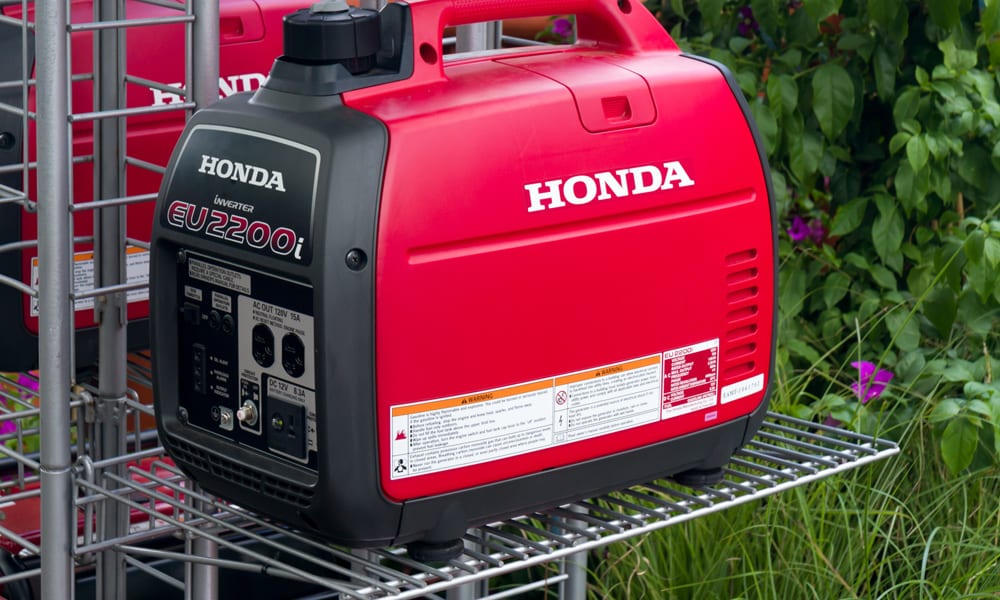
FAQs
How does a generator work?
A generator works using electromagnetic induction. The given fuel source powers the engine and creates a mechanical force. This mechanical force then encounters changing magnetic fields where the force is converted into an electrical current. See our full guide on how a generator works.
How much do generators cost?
The cost of a generator depends on the type and size of the unit. Portable generators start at around $200, while standby units can cost up to several thousand dollars.
How long do generators last?
The average lifespan of a generator is around 10-12 years. Of course, this varies depending on the type of generator and how often it is used.
How do I know what size generator I need?
The first step is to calculate your power needs by figuring out the wattage of all the appliances and devices you want to run simultaneously. Once you have that number, you can choose a generator that matches or exceeds your needs.
Can I use a generator to power my whole house?
It depends on the size of your generator and the wiring of your home. Most generators are only meant to provide power to selected appliances or devices, not an entire house. See our article on the best whole house generators.
Can I use a generator in an emergency?
Yes, generators can be a great backup source of power during emergencies. Make sure you have enough fuel stored to last through the outage.
Are generators safe?
Yes, as long as you take some basic precautions. Be sure to read the manufacturer’s instructions carefully and follow all safety guidelines.
Conclusion
Buying a generator – whether it be for emergency backup, the construction site, or camping with the family – can seem incredibly intimidating if you don’t know what you’re looking for. Distinguishing between conventional and inverter generators, deciding on fuel types, power output, and run times will easily have your head spinning.
When facing such a complicated decision and buying an expensive piece of equipment like this, it’s essential to understand what features are important and determine what model best suits your individual needs. Having the best generator for your specific situation – whether that be the best portable generator, the best standby generator, or the best inverter generator – will help you get the most for your money.
After reading through this guide, and the reviews of the top 10 best generators, you should feel well-equipped to purchase the best-suited model for your needs.
